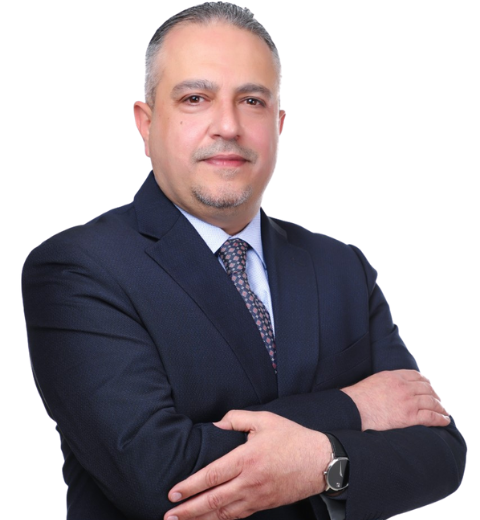“Empowering Lives, Inspiring Hope: Where Comprehensive Care Meets Compassionate Support for Multiple Sclerosis”
What is Multiple Sclerosis
Multiple Sclerosis (MS) is a chronic and unpredictable disease that greatly affects individuals’ functional abilities, physical and emotional well-being, and overall quality of life. The management of this condition requires the collaboration of various healthcare professionals, each offering their unique expertise to address the disease and its symptoms effectively.
MS affects each person differently, the team at Burjeel Multiple Sclerosis Comprehensive Care Centre is dedicated to providing outstanding care that addresses each person’s individual experience of living with the condition.
Our team of MS experts works closely with you and your family to maximize your potential and minimize your symptoms. Through diagnostic testing and a neurological examination, we identify your type of multiple sclerosis and develop a personalized management plan aimed at halting the disease and alleviating symptoms.
Burjeel MS Multidisciplinary team
Burjeel Center has an experienced and dedicated team of MS specialists who are committed to meeting the unique needs of patients with multiple sclerosis and other autoimmune neurological conditions. Our physicians and nurses work together with physical, occupational therapists, clinical psychologists, Psychiatrist, Radiologist, Ophthalmologist to leverage our unique team approach to these complex disorders and symptoms.
Access to Care
Whether you are newly diagnosed with multiple sclerosis or have been living with multiple sclerosis for many years and want a fresh perspective on management, we are here to help. While many large medical centers have long waiting lists, we aim to see everyone within a week of them reaching out to us. We offer many convenient ways to see one of our specialists, including in-person appointments, by Calling or WhatsApp to +97180055.
Technology and Innovation
We integrate technology in all aspects of patient care and research. All patients under our care undergo diagnosis and monitoring with the latest tools, including state-of-the-art imaging, routine neuroperformance testing and availability of on-site optical coherence tomography and 3-Tesla MRI.
Emphasis on Wellness
The impact of overall health status and fitness on neurological disorders is being increasingly appreciated. In addition to emphasizing health and wellness as a part of our routine care, we offer specialized appointments with providers certified in complementary wellness program like yoga.
Return to Function / Rehabilitation Expertise
Helping patients return to function is one of our very important goals, apart from clinical and research efforts aimed at retraining and repairing the nervous system, our expert multidisciplinary rehabilitation team is invested in helping patients improve function using the best available tools of today, while developing and implementing the rehabilitation treatments of tomorrow.
Burjeel Holdings has invested in cutting edge rehabilitation technologies that can well applied to MS care, including use of the Walk Bot middle east’s first multifunctional robot assisted gait training device and a full video gait analysis lab inclusive of assessing muscle function with EMG gait analysis. Also utilized are hi-tech gymnasiums, hydrotherapy, Hyperbaric oxygen treatments and highly specialized robotic exoskeleton to augment neurorehabilitation.
What we treat?
Diseases & Conditions
- Multiple Sclerosis.
- Neuromyelitis Optica (Devic’s Disease).
- Anti-MOG-associated Disease.
- Optic neuritis
- Spasticity.
- Transverse Myelitis.
- Acute Disseminated Encephalomyelitis.
- Autoimmune Encephalitis.
- Autoimmune Neurological Disorders.
Diagnostics & Testing
- Evoked Potentials.
- Lumbar Puncture.
- Magnetic Resonance Imaging (MRI).
- Neuropsychological Evaluations.
- Optical Coherence Tomography.
Treatments & Services
- IV Steroids for Multiple Sclerosis.
- Disease Modifying Agents.
- Infusion Centre.
- Neurorehabilitation Services.
- Treating Spasticity with Botox.
Our Team
Neurologists

Dr. Halprashanth Doopadahalli Sathyanarayana
Consultant Neurologist
Multiple sclerosis Certified Specialist
Director, Burjeel Multiple sclerosis Center

Dr. Mohamed Salah Ahmed Gamea
Specialist Neurologist
Multiple sclerosis Certified Specialist

Dr. Atta Ghassan
Specialist Neurologist
HOD, Department of Neurology
- MS /Neurology nurse
- MS coordinator
- Ophthalmologist
- Psychiatrist
- Urologist
- Physical medicine and rehabilitation
- Psychologist
- Dietitian
- Physiotherapy
- Speech therapy
- Occupational therapist 9uu
- Radiologist
- Infusion Nurse
- Pharmacist
Understanding Multiple Sclerosis (MS)
Multiple Sclerosis (MS) is a complex autoimmune condition affecting the central nervous system (CNS), comprising the brain and spinal cord. In MS, the body’s immune system mistakenly attacks the myelin sheath, the protective covering surrounding nerve fibers. This results in inflammation, damage to the myelin, and potentially to the underlying nerves themselves.
Causes and Risk Factors
While the exact cause of MS remains unknown, it is believed to involve a combination of genetic, environmental, and immunological factors. Genetic predisposition may play a role, as well as certain viral infections and environmental triggers. MS is not considered a hereditary condition, but there may be a genetic component that increases susceptibility.
Types of Multiple Sclerosis
There are several clinical courses of MS, each with its own characteristics and progression patterns:
- Relapsing-Remitting MS (RRMS): Characterized by periods of relapse or flare-ups, followed by partial or complete recovery.
- Secondary Progressive MS (SPMS): Begins as RRMS and transitions into a progressive phase marked by a gradual worsening of symptoms.
- Primary Progressive MS (PPMS): Progresses steadily from the onset with no distinct relapse-recovery periods.
- Clinically Isolated Syndrome (CIS): Presents as a single episode of neurological symptoms suggestive of MS but does not meet the criteria for a definitive diagnosis.
- Radiologically Isolated Syndrome (RIS): A clinical situation in which a person has white matter lesions suggestive of multiple sclerosis, as shown on an MRI scan that was done for reasons unrelated to MS symptoms like for headache etc.
Symptoms and Manifestations
MS symptoms can vary widely and may affect virtually any part of the body. Common symptoms include:
- Fatigue
- Weakness or numbness in limbs
- Vision problems (blurred vision, double vision)
- Coordination and balance difficulties
- Sensory disturbances (tingling, burning sensations)
- Cognitive impairments (memory problems, difficulty concentrating)
- Bowel and bladder dysfunction
- Emotional changes (depression, anxiety)
Diagnosis and Evaluation
Diagnosing MS entails a comprehensive evaluation, including:
- Medical History: A detailed assessment of symptoms, medical history, and family history.
- Neurological Examination: Evaluation of neurological function, reflexes, and sensory responses.
- MRI Imaging: Magnetic Resonance Imaging (MRI) of the brain and spinal cord to detect lesions indicative of MS.
- Visual Evoked Potentials (VEP): Assessment of visual function and nerve conduction. It involves stimulating the visual pathway from the retina to the brain thus checking how well your eyes send signals to your brain. During the test, you’ll look at flashing lights, and small wires (electrodes) on your head will record how your brain responds.
Lumbar Puncture (Spinal Tap):
A medical procedure involving the collection of cerebrospinal fluid (CSF) from the spinal canal in the lower back. This sample is then analyzed to diagnose and detect specific diseases or conditions affecting the central nervous system and to check whether there are any abnormalities suggestive of MS.
One crucial aspect of diagnosing MS is understanding “dissemination of lesions in time and space.” This concept refers to the occurrence of MS-related changes over different periods (dissemination in time) and in different areas of the brain and spinal cord (dissemination in space).
Doctors look for evidence that MS-related problems have happened at different times and in different parts of the brain and spinal cord. This helps confirm the diagnosis of MS and rule out other possible causes of similar symptoms.
Treatment and Management
While there is currently no cure for MS, various treatment options are available to manage symptoms, slow disease progression, and improve quality of life. These may include:
Disease-modifying therapies (DMTs) to reduce relapse rates and delay disability progression. These therapies work by calming the immune system, lessening the severity of the inflammatory response that drives the disorder. Starting DMT treatment early is often recommended to maximize its benefits. Common DMTs include interferon beta-1a, interferon beta-1b, glatiramer acetate, teriflunomide, cladribine, Fingolimod, ofatumumab, ocrelizumab, Alemtuzumab and natalizumab, available in various forms such as oral medications, injections, or infusions, tailored to individual preferences and medical history.
- Symptomatic treatments to alleviate specific symptoms such as fatigue, spasticity, and pain.
- Rehabilitation strategies including physical therapy, occupational therapy, and speech therapy to enhance mobility and function.
- Lifestyle modifications such as exercise, stress management, and dietary adjustments to promote overall well-being.
- Supportive Care such as counseling, support groups, and psychological therapies to address the emotional impact of MS, which can include feelings of anxiety, depression, and stress. These services offer invaluable emotional support, helping patients effectively cope with the challenges of living with MS.
Multiple Sclerosis is a complex and multifaceted condition that requires comprehensive evaluation and individualized management. With ongoing research and advances in treatment, individuals living with MS can lead fulfilling lives and effectively manage their symptoms. For personalized evaluation and management of MS, please contact our specialized MS clinic at Burjeel Hospital.
What to expect at Burjeel MS Center
The evaluation process at Burjeel Multiple Sclerosis centre typically involves a comprehensive approach to assess the patient’s condition and needs. Here is a detailed outline of how a patient may be evaluated at the centre.
Welcoming at Reception:
Upon arrival at the Burjeel Multiple Sclerosis Clinic, the patient will be welcomed at the reception by the staff and guided through the registration process efficiently and with empathy.
Neurological Assessment:
Following check-in, a detailed medical history from the patient. This will include information about the patient’s symptoms, past medical conditions, family history, and any medications they are currently taking.
Neurological assessment conducted by our neurologist certified in Multiple Sclerosis. The assessment included an evaluation of the patient’s motor skills, sensory functions, coordination, reflexes, and overall neurological status.
Laboratory Tests:
Blood tests may be conducted to rule out other potential causes of the patient’s symptoms and to monitor disease activity. This may include tests for inflammation markers or specific antibodies.
MRI (Magnetic Resonance Imaging):
Then Patient will undergo MRI scanning to obtain detailed images of the brain and spinal cord. The MRI examination helps in visualizing any lesions, inflammation, or other abnormalities associated with Multiple Sclerosis.
VEP (Visual Evoked Potentials) Test:
A Visual Evoked Potentials test was performed to assess the functionality of the patient’s visual pathway and identify any delays or abnormalities in the transmission of visual information to the brain.
Spinal Tap:
A lumbar puncture, also known as a spinal tap, was conducted to analyse the cerebrospinal fluid for markers indicative of Multiple Sclerosis, such as the presence of oligoclonal bands or increased levels of certain proteins.
Neuropsychological Assessment:
The patient will undergo neuropsychological assessment to evaluate cognitive functions, memory, attention, and other mental processes affected by Multiple Sclerosis.
Functional Assessments:
Depending on the patient’s symptoms and needs, additional functional assessments may be conducted to evaluate their ability to perform daily tasks and activities. This can help inform treatment planning and rehabilitation interventions.
Collaborative Care:
The evaluation process at Burjeel Multiple Sclerosis centre often involves a multidisciplinary team of healthcare professionals, including neurologists, physical therapists, occupational therapists, and Psychologist. This collaborative approach ensures that all aspects of the patient’s care are addressed.
Follow-up Consultation:
Following the series of evaluations and tests, the patient will have follow-up consultation with the healthcare team to discuss the results, establish a treatment plan, and address any concerns or questions the patient may have regarding their condition.
Treatment Planning:
Based on the results of the evaluation, a personalized treatment plan will be developed for the patients. This may include disease-modifying therapies, symptom management strategies, and lifestyle modifications, will be recommended to the patient. Additionally, regular follow-up appointments and monitoring will be scheduled to ensure optimal management of the patient’s Multiple Sclerosis.
Overall, the evaluation process at Burjeel Multiple Sclerosis centre aims to provide a comprehensive assessment of the patient’s condition and needs to deliver high-quality, personalized care for individuals living with multiple sclerosis.








